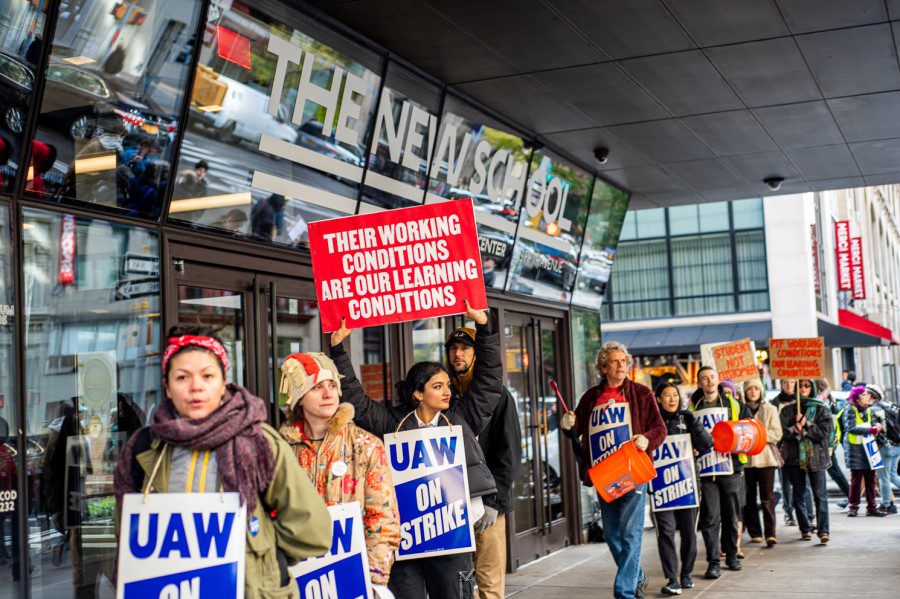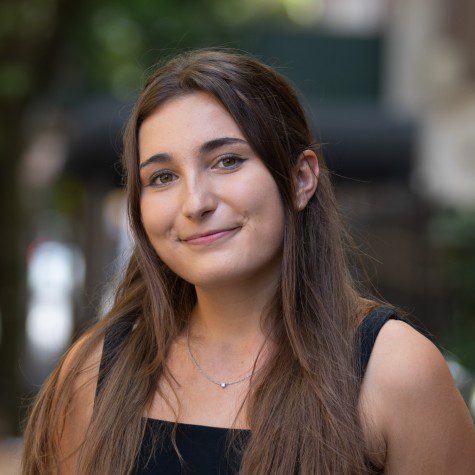New School shutdown to continue after striking faculty dismiss latest offer
Part-time faculty at The New School are nearing the end of the first week of a strike for better compensation and workplace protections.
The New School adjuncts went on strike on Nov. 16, joined on the picket line by students. (Manasa Gudavalli for WSN)
November 22, 2022
Negotiations between The New School and its part-time professors hit a standstill on Sunday, but faculty and their supporters were rallying in large numbers on Monday, the sixth day of the strike.
The New School made compromises on several key faculty demands in a “final offer” on Sunday — even though it said it would continue to bargain. But the union was unsatisfied, accusing the university of abandoning a bargaining process that has spanned more than five months.
Part-time faculty had first called a strike on Nov. 16 after failing to reach a contract agreement with the university. Both parties continue to disagree on terms related to workplace protections and compensation.
Although several New School faculty and students expressed their disappointment about stalled negotiations, the recent standoff spurred organizers and supporters to continue their strike and bring more energy to a bustling picket line.
“I’m willing to stick out here as long as it takes for them to move further, especially on wages and health care, which are the big two,” said Brice Garrett, a part-time professor at The New School’s Parsons School of Design, speaking to WSN on the picket line on Monday. “It feels really active today, with really a lot of energy — way larger than when I was here last week.”
On Monday, picketing had overflowed from its usual spot in front of the University Center building, and a second line had formed across Fifth Avenue. Passing vehicles honked in support, while students and faculty members chanted, drummed and clapped. One attendee tap-danced in the middle of a circling line of placard-wearing protesters.
In its “final offer,” presented on Sunday, The New School offered a 7% increase in wages this year and a 2.5% increase in subsequent years, better access to health care, and a contribution to a faculty retirement fund. The union said the offer wasn’t enough, noting that part-time faculty have not received a raise since 2018 — meaning that by the new contract’s expiration date, compensation increases will average out to about 1.8% per year. It has also said that other unionized employees at the university, including librarians, have won incremental wage increases between two and three percent.
“The New School decided it no longer wants to engage in good faith negotiations with part-time faculty and are instead seeking to force through an agreement with unacceptable concessions,” a Nov. 21 statement from union leadership reads. “Therefore, the union will continue to strike.”
The university has asked the union to review the offer and respond by noon on Tuesday.
“Please know that we deployed and committed every available resource to present an offer that reflects our deeply held respect for part-time faculty,” a statement from The New School reads. “Importantly, we believe this proposal also will allow the university to meet its obligations to the entire community while continuing to provide exceptional educational experiences for our students.”
Molly Ragan, a part-time professor at The New School who previously attended the university as a graduate student and worked as a teaching assistant, said the university’s offer ignored many of the union’s top demands.
“We need them to recognize that it is about the numbers for us, but it’s also about the structures that they have in place in our old contracts that really need to change,” Ragan said. “We need them to be thinking bigger, and they’re just not.”
Ragan has been present at the picket line frequently since the strike was called. She said it felt more energized than ever on the day after the “final offer” was issued.
“We’ve really built something here, and the university can’t squash that,” she said on Monday. “We have a lot of power here. It’s just really great to see so many people behind them.”
Most classes at The New School have not met since the strike began, though students said that some full-time professors who are not participating in the strike are still holding classes on Zoom or organizing field trips outside of the classroom.
Vic Walsh, a student at The New School, emphasized that part-time instructors have had a large impact on their experience at university. They said they have been aware of the difficult working conditions that faculty often face at the university, and they are motivated to continue standing behind the movement by attending the picket line instead of their classes.
“I really care about my part-time faculty,” Walsh said. “I’m glad that, at least, something can maybe happen now. It’s really important that we get out here and make some noise.”
Last month, adjunct faculty at NYU — also part of the same union, ACT-UAW Local 7902 — won a “landmark” tentative contract with the university, gaining better compensation, broader healthcare benefits and employment safeguards. The agreement was struck between NYU and its adjuncts after months of negotiations, two contract extensions, a near strike and a final marathon bargaining session that lasted until 3 a.m. — three hours after the union’s previous contract had officially expired.
[Read more: Adjunct union reaches tentative contract with NYU]
Several faculty at The New School’s picket line referenced the gains that NYU’s adjuncts won this year, calling on their university to match certain contract agreements — notably, compensation for work done outside of scheduled class time.
“We hope that The New School administration is hearing that right down the road at NYU, that we are getting money for out of classroom work,” said Annie Levin, a staff organizer for the union who also worked to negotiate NYU’s contract. “We have third-party arbitration for harassment and discrimination, and these are boilerplate, normal things for part-time faculty unions nationwide. The New School needs to wake up.”
The New School’s strike continues as nearly 50,000 employees across 10 schools in the University of California system are participating in the second week of the largest ever academic worker strike in the country. A nationwide trend of unions organizing and striking reaches across other industries as well, with over 250 HarperCollins Publishers employees on strike as of Nov. 10. More than 100 unionized Starbucks locations also saw strikes last Thursday, lining up with one of the chain’s busiest days — Red Cup Day, which marks the start of the holiday season.
Contact Abby Wilson at [email protected].



























































































































































